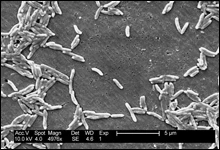
The U.S. Department of Agriculture’s (USDA’s) Food Safety and Inspection Service (FSIS) has issued a new set of performance standards to reduce the incidence of Salmonella and Campylobacter bacteria in young chickens and turkeys.
The new standards hold poultry slaughterhouses more accountable by decreasing the number of samples allowed to test positive for the pathogens. After two years under the new standards, USDA predicts that 39,000 illnesses due to Campylobacter will be avoided each year as will 26,000 fewer illnesses attributable to Salmonella.
Although Center for Science in the Public Interest (CSPI) Food Safety Director Caroline Smith DeWaal generally welcomed the standards, she lamented the fact that “USDA still lacks authority to enforce these standards by closing failing plants. For consumers to fully realize the benefits of the improved standards, Congress should reinstate USDA’s authority to enforce its performance standards.”
In a related move, FSIS has issued the third edition of a compliance guide for poultry slaughter that includes recommendations for controlling Salmonella and Campylobacter.
FSIS will accept comments on the performance standards and compliance guide until July 13, 2010. See USDA Press Release and CSPI Website, May 10, 2010; Federal Register, May 14, 2010.
Latest from Quality Assurance & Food Safety
- California Investigates Salmonella Outbreak Linked to Recalled Vega Farms Eggs
- FDA, Alliance to STOP Foodborne Illness Host Webinar Series
- Chef Robotics Introduces Pat-Down Capability for Meal Presentation and Sealing
- USDA Launches Regenerative Pilot Program
- Indoor Ag-Con Adds Food Safety Track to Conference Lineup
- IDFA Recognizes Federal Officials for Support of U.S. Dairy Industry
- Tetra Pak Acquires Bioreactors.net
- Fresh Del Monte Receives Rabobank Leadership Award





